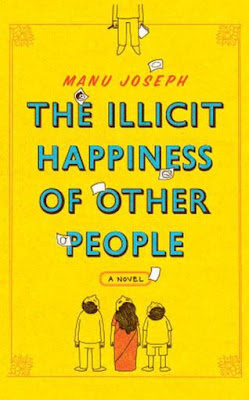Book Review: The Illicit Happiness of Other People
Having thoroughly enjoyed Manu Joseph's debut novel Serious Men, which pitted a Dalit man against his Brahmin boss at a research facility in Mumbai while essaying the caste differences that exist in the country, I was naturally inclined to pick up this one too. And what a book it is! Joseph's sophomore effort is set in the early 90's Madras, a booming metropolis yet to come to its terms with the advancements that were beginning to take shape; the city which has always been a little more conservative when compared to Bombay or Delhi.
 |
| Just brilliant |
Unni was seventeen when he died (or rather committed suicide) on 16 May, 1987. An exceptional cartoonist and well ahead of his age, why did Unni Chacko do what he did? That's exactly what his father wants to know as well. And thus three years later, he embarks on a quest for truth. I recommend you to read this book to know the answers.
The prose is written beautifully with enough heart-breaking moments and humour squeezed in right amounts, and Joseph masterfully gives the plot an aura of mystery and excitement as it proceeds. Chacko as the negligent father who undertakes this mission to learn about his son is so wonderfully fleshed out. The same can be said of the cherubic Thoma and his mother Mariamma. The character of Unni is an enigma; he is never physically present and all we get to know him is in bits and pieces throughout the course of the book.
The author paints a vivid picture of the city and captures its socio-political mood really well. In the novel's early portions, he writes that "(t)he day they (referring to the boys in general) were born and were diagnosed with having a penis, their fate was decided - to one day take the Joint Entrance Exam". I was so struck by this simple yet profound statement; partly because that's the truth. The demonstrations for the cause of Sri Lankan Tamils furthers this authentic backdrop.
But the main themes he explores relate to the philosophy of truth, delusion ("Truth is a successful delusion," says a character) and total happiness. Is it possible for a person to be be 'hopelessly happy'? "I would argue that inexplicable happiness is also a mental condition," Joseph remarks in an interview with the Hindu on the subject. Skillfully written, Manu Joseph's TIHoOP is a must read for all book lovers out there!
Related: Manu Joseph's interview in the Hindu Sunday Magazine

Comments
Post a Comment